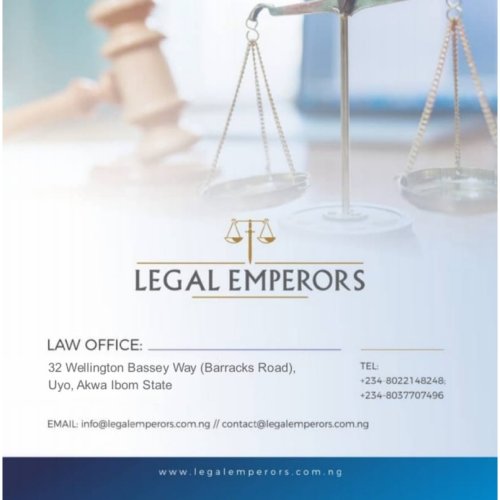Best International Trade Law Lawyers in Uyo
Share your needs with us, get contacted by law firms.
Free. Takes 2 min.
List of the best lawyers in Uyo, Nigeria
About International Trade Law in Uyo, Nigeria
International Trade Law governs the rules and customs for handling trade between countries. In the context of Uyo, Nigeria, this involves compliance with both international and Nigerian regulations that oversee trade interactions, duties, tariffs, disputes, and the movement of goods and services across borders. Given Nigeria's strategic position and Uyo's growing economic activities, understanding these laws is essential for conducting cross-border trade efficiently.
Why You May Need a Lawyer
Engaging in international trade can be complex and fraught with legal challenges that require professional assistance. Here are some common scenarios where seeking a lawyer in International Trade Law is advisable:
- Navigating international trade agreements and treaties.
- Resolving trade disputes and managing litigation.
- Ensuring compliance with import/export regulations.
- Handling tariffs, duties, and other trade barriers.
- Interpreting and applying international trade policies and regulations.
- Safeguarding intellectual property rights across borders.
- Guidance on international shipping and logistics terms and conditions.
- Advising on cross-border contracts and agreements.
Overview of Key International Trade Laws in Nigeria
Some of the key aspects of international trade laws applicable in Uyo include:
- Import and Export Regulations: Governed by customs laws, these regulations dictate the permissible goods and the duties applicable to them.
- Trade Agreements: Nigeria is a signatory to several international agreements, including WTO agreements, which are relevant for businesses in Uyo.
- Tariffs and Duties: Customary checks on various taxes imposed on imports and exports are regulated by national policy, which requires careful understanding.
- Sanctions and Trade Restrictions: Knowing the sanctioned goods, countries, and entities is essential to avoid legal violations.
- Intellectual Property Laws: Protect against IP theft and ensure that trademarks and patents are registered in line with international standards.
- Contractual Agreements: Special attention is needed for contracts to ensure they meet international standards and are enforceable globally.
Frequently Asked Questions
1. What is International Trade Law?
International Trade Law encompasses the set of laws and agreements that regulate trade between countries, ensuring fair practices and resolving disputes.
2. How do I register a business for international trade in Nigeria?
You need to register with the Corporate Affairs Commission (CAC) and obtain relevant permits from Nigerian Customs Service for importing and exporting goods.
3. What are the benefits of trade agreements?
Trade agreements can lower tariffs, enhance market access, and provide a stable environment for international trade, benefiting businesses in terms of cost and reach.
4. How can a lawyer help me resolve a trade dispute?
A lawyer can provide guidance on international legal requirements, negotiate settlements, and represent you in court or during international trade arbitrations.
5. How does the government monitor import and export activities?
Nigerian Customs Service is responsible for monitoring and enforcing regulations related to importing and exporting products.
6. What are non-tariff barriers?
Non-tariff barriers include quotas, levies, embargoes, sanctions, and other restrictions or prohibitions that countries use to control imports and exports.
7. Is labeling important for international trade?
Yes, accurate labeling ensures compliance with import regulations and reduces the risk of trade disputes over mislabeling or non-compliance with international standards.
8. What is anti-dumping?
Anti-dumping involves rules and measures to prevent a foreign company from harming local businesses by selling goods below market cost in another country.
9. How can one avoid contract disputes in international trade?
Clearly define terms, seek counsel to tailor contracts according to international standards, and ensure all parties understand contract terms.
10. What resources are available to help understand International Trade Law in Nigeria?
Resources include government publications from the Nigerian Customs Service, online courses, and expert consultations with trade law specialists.
Additional Resources
For further information, consider exploring resources such as:
- The Nigerian Customs Service for rules on duties and tariffs.
- The Nigeria Investment Promotion Commission for foreign investment guidance.
- The International Chamber of Commerce (ICC), Nigeria Chapter for global trade practices.
- Local law firms and legal experts in trade law for specialized legal advice.
Next Steps
If you need legal assistance with International Trade Law in Uyo, consider the following steps:
- Research and contact reputable law firms specializing in international trade.
- Prepare necessary documentation and information related to your trade activities.
- Schedule consultations to discuss your specific situation and seek expert legal advice.
- Stay informed on any legal changes in international trade that could impact your operations.
Lawzana helps you find the best lawyers and law firms in Uyo through a curated and pre-screened list of qualified legal professionals. Our platform offers rankings and detailed profiles of attorneys and law firms, allowing you to compare based on practice areas, including International Trade Law, experience, and client feedback.
Each profile includes a description of the firm's areas of practice, client reviews, team members and partners, year of establishment, spoken languages, office locations, contact information, social media presence, and any published articles or resources. Most firms on our platform speak English and are experienced in both local and international legal matters.
Get a quote from top-rated law firms in Uyo, Nigeria — quickly, securely, and without unnecessary hassle.
Disclaimer:
The information provided on this page is for general informational purposes only and does not constitute legal advice. While we strive to ensure the accuracy and relevance of the content, legal information may change over time, and interpretations of the law can vary. You should always consult with a qualified legal professional for advice specific to your situation.
We disclaim all liability for actions taken or not taken based on the content of this page. If you believe any information is incorrect or outdated, please contact us, and we will review and update it where appropriate.











